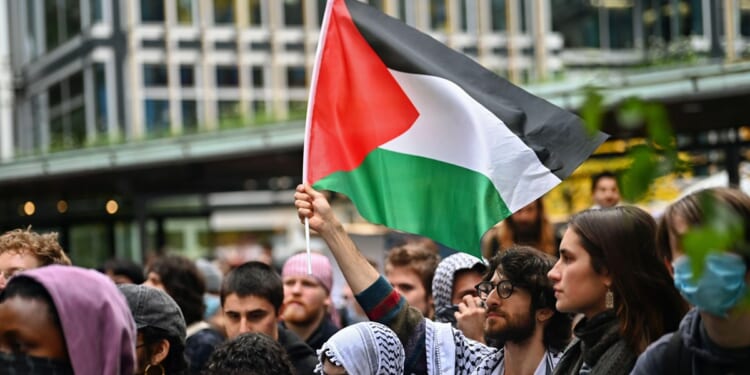HUMAN rights inherently imply human responsibilities. That is something to remember when trying to pick a path through the maze of issues which surrounds the pro-Palestine marches in British and European cities this week. And it equally applies to those holding the vigil outside the Manchester synagogue that was subjected to a murderous attack last week.
The right of British citizens to worship — in synagogue, mosque, or church — without fear or molestation ought to be so self-evident that it is a shocking indictment of our polarising times that it even needs to be stated. It has also been an important English freedom, for a millennium, that citizens have the right to take to the streets to protest against the actions — or inactions — of their government.
Suggestions by the Home Secretary that these freedoms are now to be curtailed in some way are not just a matter of concern for human-rights lawyers. A former chief constable, Sir Peter Fahy, this week suggested that giving police more anti-protest powers might cause more problems than they solved. He even went so far as to say that the outlawing of Palestine Action might have been an unwise move (Comment, 29 August).
Philosophers have tussled with the balance between rights and responsibilities ever since Aristotle stated that a citizen’s virtue must necessarily be relative to the society of which he was a member. Enlightenment thinkers saw it as involving a contract of mutual obligation between individual and society. Simone Weil went so far as to suggest that responsibilities were more fundamental than rights.
It was entirely reasonable, therefore, for Sir Keir Starmer to suggest that it would be admirably sensitive for pro-Palestinian protesters to suspend their marches while the synagogue vigil occurred in Manchester. But it was not reasonable for Jewish speakers at the vigil to suggest the banning of all protests over the war on Gaza as “hate marches”.
The idea that anyone would want to celebrate the second anniversary of the 7 October Hamas attacks, as happened at several universities, may well be described in such terms. But no decent and civilised government should consider curbing marches against the wilful starvation of civilians — and the reckless industrialised slaughter of children in pursuit of Hamas terrorists.
Though Benjamin Netanyahu wildly brands all criticism of his government as anti-Semitic, it is profoundly important to maintain that there is a distinction between legitimate criticism of his out-of-control government and hatred of ordinary Jewish people.
Conflating these two is a form of libel. It is paradoxical, therefore, that many of the Jewish citizens at the vigil chose to wrap themselves in an Israeli flag. Conflating Jewishness, Judaism, the State of Israel, disparate forms of Zionism, and the brutal policies of the Netanyahu regime serves neither side in the argument.
There is a problem with flags generally. They stand for a kind of nationalism which does not argue or persuade, but merely waves an unsubstantiated emotional declaration in the face of those whom it considers the enemy or the other. Our own debate on the use of the flags of St George and the Union should make us alive to the confusion of emotion, memory, and myth — and of rights and responsibilities.

















